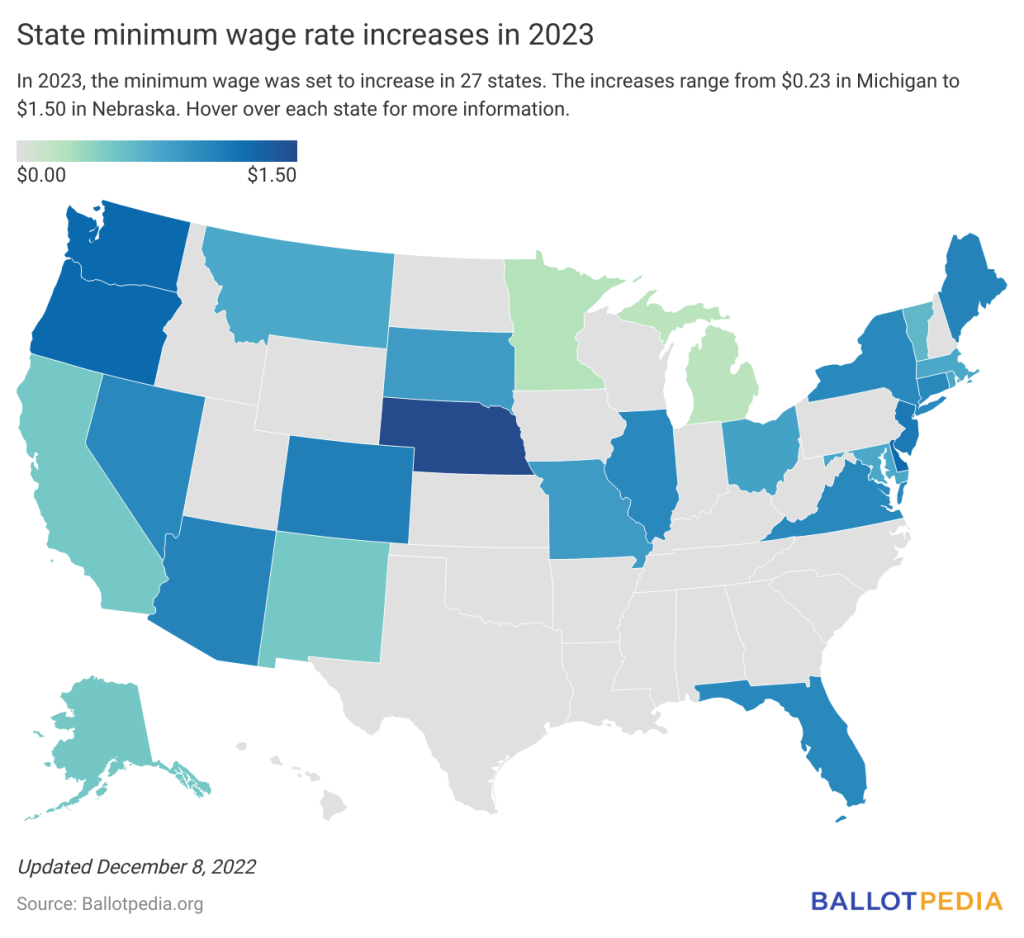In 2023, the minimum wage was set to increase in 27 states. The increases range from $0.23 in Michigan (a 2.28% increase from 2022) to $1.50 in Nebraska (a 14.29% increase from 2022).
- one increase was set to take effect on December 31, 2022;
- 22 increases were set to take effect on January 1, 2023;
- one was set to take effect on June 1, 2023;
- two were set to take effect on July 1, 2023; and
- one was set to take effect on September 30, 2023.
Going into 2023, 20 states used the federal minimum wage rate of $7.25, and 30 states provided for state minimum wages above the federal minimum wage.
The 2023 increases come from state laws adopted in the past that provided for incremental increases of inflation adjustments. The highest state minimum wage in 2023 will be in Washington at $15.74.
The wage in Washington, D.C., increased from $15 to $16.10 on July 1, 2022, making it the highest minimum wage in the country. Additionally, voters in Washington, D.C., approved Initiative 82 in 2022 which increased the tipped minimum wage from $5.35 in 2022 to match the minimum wage of non-tipped employees in 2027.
Wages were lowest in Georgia and Wyoming, where the states' $5.15 minimum wages are superseded by the federal government's $7.25 per hour requirement.
On November 8, voters in Nebraska and Nevada approved minimum wage ballot measures. Nebraska Initiative 433 was designed to incrementally increase the state's minimum wage from $9 to $15 by 2026 and annually adjust the minimum wage thereafter by the cost of living.
Nevada Question 2 was designed to increase the minimum wage for all employees to $12 per hour by July 1, 2024, replacing the existing two-tiered system in which employees who receive healthcare benefits were set to have a lower minimum wage ($11) than those who do ($12) in 2024. On July 1, 2022, the minimum wage increased to $9.50 for employees with employer health benefits and $10.50 for employees without employer health benefits.
In 2022, one state legislature passed a bill providing for minimum wage increases. Hawaii Governor David Ige (D) signed House Bill 2510 into law as Act 114, raising the $10.10 per hour minimum wage to $12.00 per hour starting on October 1, 2022. Act 114 was designed to increase the minimum wage to $14.00 on January 1, 2024, to $16.00 on January 1, 2026, and $18.00 on January 1, 2028.
From 1996 to 2022, there were 28 minimum wage increase measures on the ballot. Voters approved 26 (92.86%) and rejected two (7.14%). The last time that voters rejected a minimum wage increase measure was in 1996, when measures were defeated in Missouri and Montana.




